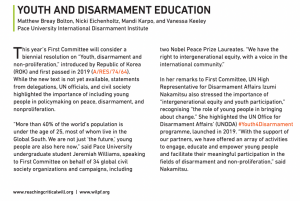The following reflection is from Nicki Eichenholtz ’22, a Pace University undergraduate who participated in the POL297L Global Politics of Disarmament and Arms Control class in Fall 2021. Students were given service-learning assignments with disarmament advocacy organizations working in and around the UN and New York City. Nicki’s assignment was with Reaching Critical Will, the disarmament program of the Women’s International League for Peace and Freedom (WILPF), the oldest women’s peace organization in the world.
For my civic engagement assignment I worked with the organization Reaching Critical Will, writing and editing articles about proceedings of the United Nations General Assembly First Committee (Disarmament and International Security) for their magazine, First Committee Monitor. We read through official written statements and notes of verbal comments from participating UN countries after every session, looking specifically for discussion of youth education and disarmament.
When I first received this assignment, and the opportunity to work for an organization surrounding the struggle for disarmament, I knew immediately that I wanted to be somehow involved with the UN and learn more about what exactly it is that they do.
With family heritage in several different countries and continents, the role of government and the UN appealed to me in several differing ways. As I grew up, I began to learn for myself what politics was and why different people portray the same ideals contrarily. At the center of most of my questions was the notion that a large group of countries can be bound by the same set of international laws yet have very different laws within their own countries. I did my own research on the UN but was able to find very little to satiate my curiosity.
After receiving the first set of notes and looking at the official statements that countries put out that first week, I was mind blown. The ways that some countries acknowledge what other countries said by subtly repeating the same phrase or talking about the same small detail was incredible. I stayed up very late that first week in awe of the access I had to official statements and proceedings from meetings I thought I would never be able to see. My dreams as a little girl of being a fly on the wall for some of the conversations that occur within the UN was finally coming true.
After the first two of weeks working with Reaching Critical Will, I began to notice how uneducated I was on the topic of disarmament. I had never heard of most of the resolutions that had been passed or was in the works of being passed. I did not know the history of different kinds of weapons and the devastation they had caused in certain regions of the world. I did not know that some of the major powers were manipulating other countries to vote on things in favor of that superpower rather than in favor of their own country.
The nuances of the politics within the UN First Committee were things I had never seen, and it opened up a whole new view on international politics that I had never been exposed to before.
When it came time for me to take lead on the weekly article for the magazine, I was eager. My classmates had done a fantastic job in the weeks before me, and I wanted to rise to the challenge of delivering as strong of a draft as they did. The information released by the First Committee that week was mostly filled with the voting tallies on draft resolutions. I knew that I had a 1000-word limit for the article, and it would be difficult to fit all of the information in such a small word count elegantly. I found myself feeling repetitive as I detailed the numbers of votes in favor of, against and in abstention.

Article in Reaching Critical Will’s First Committee Monitor for which Nicki was the lead author.
After triple checking all of my numbers and rereading the draft I wrote for the fifth time, I could not help but feel a bit of pride. I was finally participating in the fight for disarmament, even if it was very small and would only be seen by a few people. Nevertheless, I was now not only more educated than when I started, but I was also much more passionate and interested in working for an organization like Reaching Critical Will after graduation.
